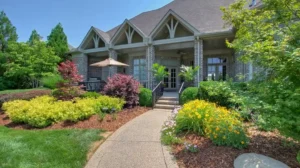Strategically selecting and caring for trees can boost property value by up to 20%. Trees provide shade, save energy, and enhance community aesthetics. Species, health, size, and positioning determine value impact. Opting for specific tree species elevates property worth with beauty and eco-benefits. Trees also increase curb appeal, privacy, and charm. Maintained trees enhance allure and can significantly raise property value. Understanding these factors is crucial for maximizing property investments. Discover the impact of trees on property value from enhanced curb appeal to environmental benefits, they’re a green investment worth considering.
Key Takeaways
- Well-maintained trees can increase property value by up to 20%
- Tree species selection significantly impacts property value appreciation
- Trees provide aesthetic charm, shade, privacy, and enhance curb appeal
- Certain tree species boost property value due to aesthetic appeal and environmental benefits
- Understanding tree species, health, size, and location is vital for maximizing property investments
Understanding Property Value Dynamics
Understanding the dynamics that impact property worth is vital for making informed choices regarding real estate investments. Factors such as location, market trends, property size, and amenities all play significant roles. Understanding how these variables interact and influence property values can help investors assess potential risks and returns accurately. Analytical evaluation of these dynamics is important for successful real estate decision-making.
Role of Trees in Property Evaluation
Trees play a pivotal role in property evaluation, significantly impacting not only aesthetic appeal but further economic value. Research shows that well-maintained trees can increase property value by up to 20%. They provide shade, reduce energy costs, and contribute to a sense of community. Strategic tree planting and care are crucial for enhancing property desirability and market competitiveness. In summary, trees are valuable assets in property evaluation.
Factors Influencing Tree Impact
The valuation of properties can be significantly influenced by a variety of factors related to plants, indicating a complex interplay between natural elements and financial considerations. Factors such as tree species, health, size, location, and overall scenery aesthetics play an important role in determining the impact trees have on property value. Understanding these elements is vital for property owners seeking to maximize the value of their investments.
Tree Species and Value Appreciation
The selection of tree species can significantly impact the value appreciation of a property. Certain tree species are known to boost property value because of their aesthetic appeal, environmental benefits, and shade provision. Understanding the economic advantages of planting specific tree species can lead to substantial property value appreciation over time.
Value-Boosting Tree Species
Among the realm of land ownership, specific tree varieties have been recognized as important agents in the process of property value appreciation. Trees like Japanese maple, flowering dogwood, and ginkgo are known to improve curb appeal and increase property value significantly. Studies show that homes with well-maintained trees of these species can command higher prices in the real estate market, making them valuable investments for property owners seeking to boost their home’s worth.
Economic Benefits of Trees
Improving property values through strategic tree selection involves a careful consideration of tree species known for their economic benefits and worth appreciation potential. Certain tree species, like the Japanese maple or flowering dogwood, are highly sought after for their aesthetic appeal and ability to increase property value. Investing in these valuable tree species can significantly elevate the overall worth of a property, making them a wise choice for homeowners looking to boost their investments.
Property Value Appreciation
Enhancing property value through strategic selection of tree species involves a detailed assessment of their economic impact and potential for appreciation. Certain tree species like Japanese maple, flowering dogwood, and London plane are known for increasing property values significantly. These species provide aesthetic appeal, shade, and privacy, making them desirable for homeowners and positively impacting the overall value of the property. Strategic planting of these species can lead to substantial value appreciation.

Enhancing Property Appeal With Trees
How do trees significantly impact the appeal of a property, influencing its value and desirability for potential buyers or renters? Trees provide aesthetic charm, shade, and privacy, enhancing curb appeal and creating a welcoming atmosphere. Studies show that well-maintained trees can increase property value by up to 20%. Choosing the right tree species that complement the property’s architecture and scenery can further enhance its overall appeal and desirability.
Sustainable Landscaping for Value Growth
Sustainable landscaping practices play a pivotal role in promoting long-term property value growth through strategic environmental management and resource-efficient design choices. Implementing eco-friendly techniques like water conservation, native plantings, and energy-efficient lighting not only improves the aesthetic appeal of a property but also contributes to increased market value and desirability. Studies have shown that sustainable landscapes can boost property values by up to 20%, making it a smart investment for homeowners seeking lasting value growth.
Expert Tips for Tree Selection
When considering tree selection for outdoor spaces, it is essential to consult with experts to ensure ideal species choices align with property aesthetics and long-term goals. Factors such as growth rate, root system size, mature height, and seasonal characteristics should be carefully evaluated. Expert tips recommend selecting native species for sustainability, considering sunlight and soil conditions, and planning for future maintenance requirements to improve property value and appeal.
Frequently Asked Questions
How Can Tree Species Impact the Value of a Property?
Tree species can significantly impact property value through aesthetics, environmental benefits, and maintenance costs. Choosing species that thrive in the local climate, improve curb appeal, and offer shade can boost property values.
Are There Specific Factors That Can Influence the Impact of Trees on Property Value?
Factors such as tree variety, size, health, and placement can influence the impact of trees on property value. Varieties that are low maintenance, provide shade, and have aesthetic appeal tend to enrich property value significantly.
Which Tree Species Are Known to Appreciate in Value Over Time?
Certain tree species like Oak, Japanese Maple, and Flowering Dogwood are known to appreciate in value over time because of their longevity, aesthetics, and desirability in landscaping. Investing in these species can potentially increase property value.
How Can Property Appeal Be Enhanced Through Strategic Tree Placement?
Strategic tree placement can improve property appeal by framing views, providing shade, and creating privacy. Trees further offer environmental benefits like reducing energy costs and increasing biodiversity. Careful selection and placement based on property layout and aesthetics are key.
What Are Some Expert Tips for Selecting the Right Tree Species for a Property to Maximize Its Value?
Choosing the appropriate tree species for a property involves taking into account factors like weather suitability, development speed, and upkeep requirements. Seeking advice from tree specialists or outdoor designers can offer expert perspectives to enhance the property’s worth.
Conclusion
In summary, the selection of tree species plays a pivotal role in influencing property value and enhancing outdoor recreational experiences. By understanding the dynamics of tree impact on property evaluation, considering factors that influence tree selection, and following expert recommendations for sustainable landscaping, property owners can maximize the aesthetic appeal and value appreciation of their outdoor spaces. The strategic integration of tree species in residential and recreational settings can lead to significant benefits in both economic and experiential terms.
You May Also Like:


